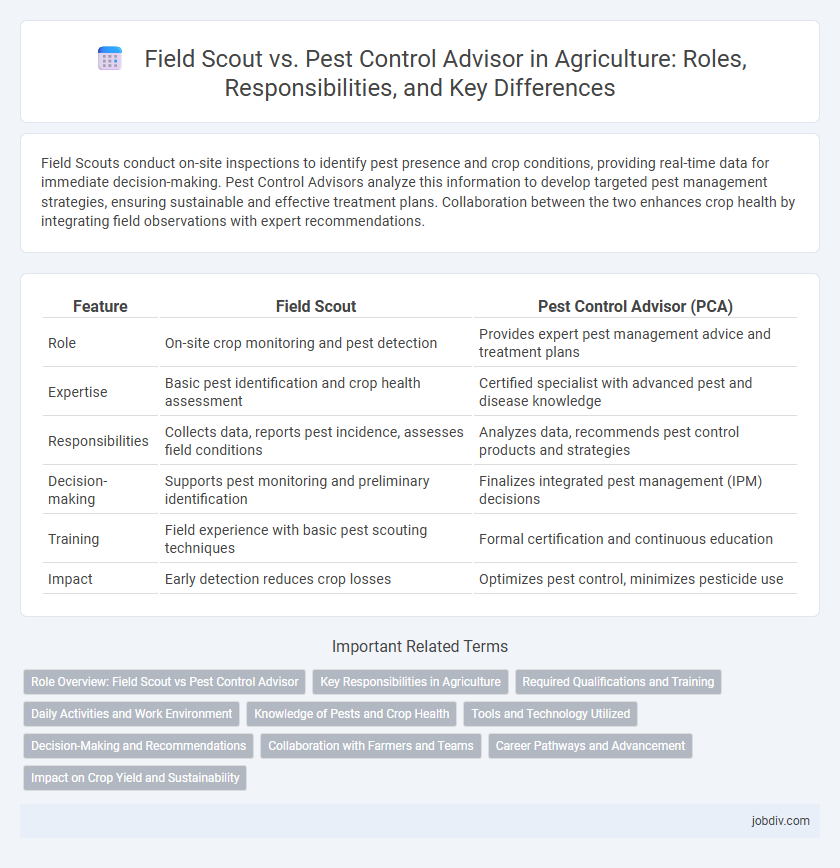Field Scouts conduct on-site inspections to identify pest presence and crop conditions, providing real-time data for immediate decision-making. Pest Control Advisors analyze this information to develop targeted pest management strategies, ensuring sustainable and effective treatment plans. Collaboration between the two enhances crop health by integrating field observations with expert recommendations.
Table of Comparison
| Feature | Field Scout | Pest Control Advisor (PCA) |
|---|---|---|
| Role | On-site crop monitoring and pest detection | Provides expert pest management advice and treatment plans |
| Expertise | Basic pest identification and crop health assessment | Certified specialist with advanced pest and disease knowledge |
| Responsibilities | Collects data, reports pest incidence, assesses field conditions | Analyzes data, recommends pest control products and strategies |
| Decision-making | Supports pest monitoring and preliminary identification | Finalizes integrated pest management (IPM) decisions |
| Training | Field experience with basic pest scouting techniques | Formal certification and continuous education |
| Impact | Early detection reduces crop losses | Optimizes pest control, minimizes pesticide use |
Role Overview: Field Scout vs Pest Control Advisor
Field Scouts primarily monitor crop health by identifying pest infestations, nutrient deficiencies, and disease symptoms, providing real-time data for informed decision-making. Pest Control Advisors (PCAs) develop and implement comprehensive pest management strategies, combining scouting data with chemical, biological, and cultural control methods to protect crop yield and quality. Both roles collaborate closely to optimize integrated pest management (IPM) programs, ensuring sustainable and effective agricultural production.
Key Responsibilities in Agriculture
Field Scouts monitor crop health by identifying pest infestations, disease symptoms, and nutrient deficiencies through regular field inspections, providing real-time data to optimize crop management. Pest Control Advisors evaluate pest populations and recommend integrated pest management strategies, ensuring effective and environmentally responsible pesticide applications. Both roles collaborate closely with farmers to enhance crop yield, protect plant health, and minimize economic losses caused by pests.
Required Qualifications and Training
Field Scouts typically require a high school diploma with specialized training in crop identification, pest life cycles, and sampling techniques, often gained through extension programs or on-the-job experience. Pest Control Advisors (PCAs) must hold a bachelor's degree in agricultural sciences or a related field and obtain state certification or licensing by passing rigorous exams covering pest management, pesticide laws, and environmental safety. Continuous education and adherence to regulatory updates are mandatory for PCAs to maintain certification and effectively advise on sustainable pest control strategies.
Daily Activities and Work Environment
Field Scouts conduct daily crop inspections to identify pest populations and assess crop conditions, often spending extensive time outdoors in varying weather conditions. Pest Control Advisors analyze field data, recommend pest management strategies, and interact with farmers in office settings or on-site visits, balancing fieldwork with client consultations. Both roles require knowledge of agricultural ecosystems, but Field Scouts emphasize hands-on observation while Pest Control Advisors focus on integrated pest management planning.
Knowledge of Pests and Crop Health
Field Scouts possess hands-on experience in identifying pest infestations and assessing crop health directly within the fields, enabling immediate and accurate data collection. Pest Control Advisors (PCAs) leverage extensive training in entomology, plant pathology, and integrated pest management to develop strategic treatment plans that enhance crop protection. Both roles require deep knowledge of pest biology and crop health, but PCAs emphasize diagnostic expertise and management, while Field Scouts focus on real-time monitoring and reporting.
Tools and Technology Utilized
Field Scouts leverage mobile apps, GPS mapping, and digital imaging technology for real-time field data collection and crop health monitoring. Pest Control Advisors utilize advanced diagnostic tools such as laboratory analysis, pest identification software, and integrated pest management (IPM) platforms to develop precise treatment plans. Both professionals employ drone technology and remote sensing to enhance pest detection and crop assessment accuracy in modern agriculture.
Decision-Making and Recommendations
Field Scouts gather real-time, on-the-ground data about crop conditions, pest populations, and environmental stressors to provide immediate insights for pest management. Pest Control Advisors analyze this detailed field data alongside historical trends, pest life cycles, and chemical efficacy to develop tailored, long-term pest control strategies. Combining the direct observations of Field Scouts with the analytical expertise of Pest Control Advisors enhances precision in decision-making and optimizes recommendations for sustainable crop protection.
Collaboration with Farmers and Teams
Field Scouts provide real-time crop data through regular field visits, enabling Pest Control Advisors (PCAs) to tailor integrated pest management strategies accurately. PCAs leverage this detailed scouting information to recommend precise treatments, fostering a collaborative approach with farmers that enhances crop health and yield. This synergy between Field Scouts and PCAs ensures timely decision-making and effective pest control interventions aligned with farmers' operational goals.
Career Pathways and Advancement
Field Scouts gain hands-on experience in crop monitoring and pest identification, often serving as entry-level roles that provide foundational agricultural knowledge. Pest Control Advisors (PCAs) hold specialized certifications and advise farmers on integrated pest management, enabling career progression toward consultancy, research, or managerial positions. Advancement in this field depends on acquiring credentials such as Certified Crop Adviser (CCA) certification and building expertise in sustainable pest control strategies.
Impact on Crop Yield and Sustainability
Field Scouts provide real-time, on-site crop monitoring that allows for early detection of pests and diseases, directly enhancing crop yield by enabling timely interventions. Pest Control Advisors analyze data and recommend integrated pest management strategies, promoting sustainable practices that minimize chemical use and environmental impact. Collaboration between Field Scouts and Pest Control Advisors leads to optimized crop health, increased yields, and long-term agricultural sustainability.
Field Scout vs Pest Control Advisor Infographic

 jobdiv.com
jobdiv.com